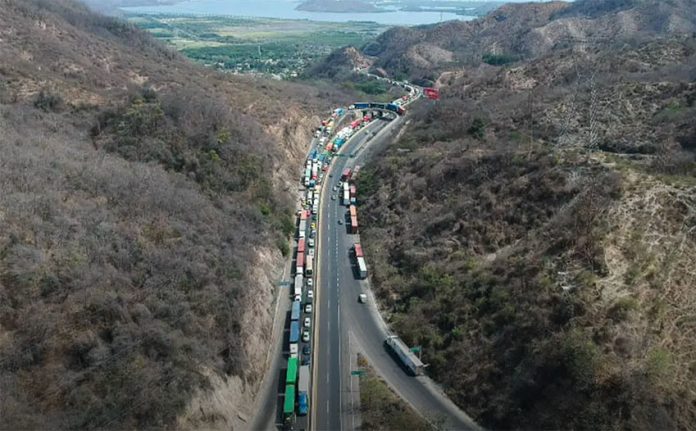Demand for cargo truck access to the port of Manzanillo, Colima, is causing traffic chaos and making road travel in the area dangerous, with further disruption predicted on Wednesday.
The Manzanillo-Colima highway is one of the most accident prone in the country because of trucks carrying cargo. On April 21 Jesús Quezada Navarro, who ran for local office in 2018, died on the scene after a truck hit two cars. Diana Pineda Parra, a candidate in the upcoming elections, was wounded.
On April 27 a container dislodged from a truck and fell on top of a car.
“The risk is constant. You can be going along just fine until you cross trucks that are in a bad state, or have containers that are not well secured. It doesn’t depend on us,” said Roberto Regla Bautista, who travels frequently to and from Manzanillo.
Resident Magaly Solis Crisantos described the danger she faces on a daily basis. “I have had various incidents and a few scares, because the trucks show no respect and invade the opposite lane,” she said.
On one freeway queues reached 20 kilometers on Saturday when customs officials were on vacation for Labor Day. Disruption is predicted for Wednesday when officials will work a half day for May 5 celebrations.
The congestion is exacerbated by trucks traveling to other unofficial ports nearby, according to a source at the port of Manzanillo, who requested anonymity.
Resident Arnoldo Saucedo Figueroa described the traffic. “You can be stuck between the trucks for up to five hours, there is an alley … and it is being used [as an alternative route] but it is in poor condition, and we have even seen trailers with containers going through there,” he said.
The port of Manzanillo is the third largest in Latin America for shipping, and is the principal commercial route to Asia across the Pacific Ocean.
First quarter activity suggests the port will return to the growth it saw before the Covid-19 pandemic, when more than 3 million containers were transported annually.
Residents are asking for authorities to intervene to help relieve the heavy traffic.
